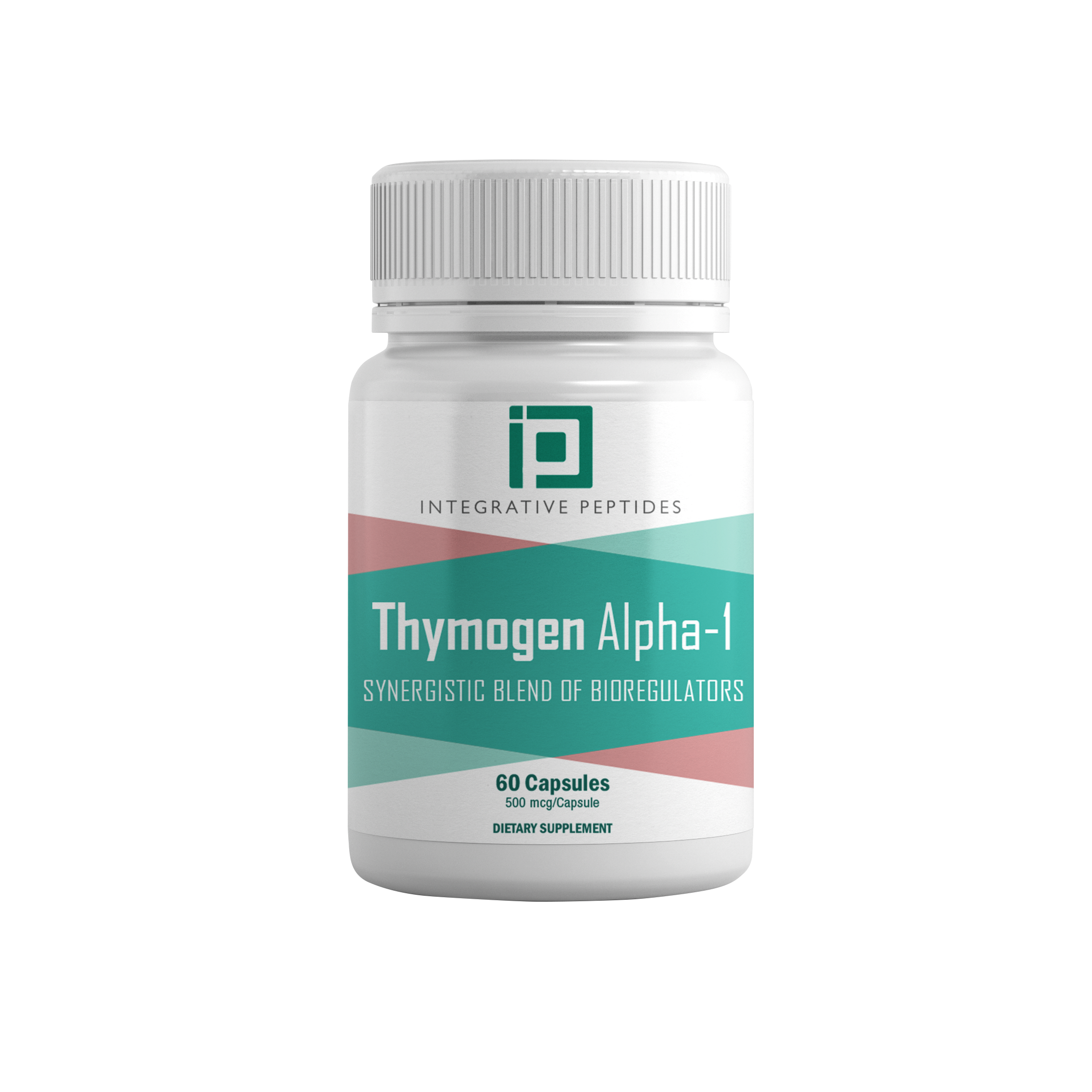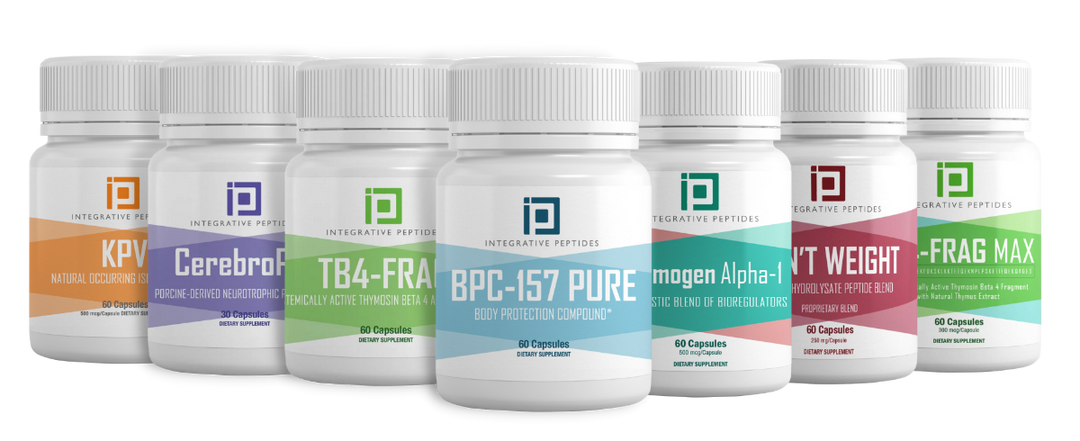What Are the Benefits of Thymogen Alpha-1?
Thymogen alpha-1’s primary role is to improve immune system function by stimulating and coordinating various molecules and pathways in the immune system. Through this, it may help with a variety of conditions, including the following.
Broad-Spectrum Impact on Autoimmune Conditions
Clinical studies have indicated that Thymosin Alpha-1 can regulate immunity and inflammation related to rheumatoid arthritis, psoriatic arthritis, and systemic lupus erythematosus, among other conditions. These findings suggest its potential in managing autoimmune diseases by modulating immune responses.
May Aid in Treating Type-1 Diabetes
In one study, Thymogen alpha-1 was used to treat patients with type 1 diabetes mellitus with evidence of secondary immunodeficiency. The Thymogen removed the signs of the secondary immunodeficiency by activating T-lymphocyte differentiation. The Thymogen had a 94.4% clinical effect.
Could Aid in Treating Pancreatitis
One study of 48 people with acute pancreatitis found that Thymogen could be part of an effective treatment. In the study, researchers found that Thymogen had an immune correcting effect, which led to positive clinical changes. The Thymogen corrected a deficiency in T-cells, which resulted in better immune system function and improvements in the acute pancreatitis.
Could Benefit Individuals with Cystic Fibrosis, Particularly in Reducing Inflammation and Improving Protein Function
Thymosin alpha-1 has shown potential benefits for individuals with cystic fibrosis by targeting inflammation and improving protein function. Research suggests that thymosin alpha-1’s strong anti-inflammatory properties could help reduce pain associated with inflammation in the peripheral and central nervous system. Specifically, this molecule acts at the site of inflammation to decrease the production of cytokines and molecules that trigger pain, such as TNF-alpha and IL-1beta.
Cystic fibrosis is characterized by significant inflammation, leading to complications like poor mucous clearance and increased infection rates. One of the key issues in cystic fibrosis is the mis-folding of the CFTR protein. Thymosin alpha-1 may potentially reduce inflammation associated with cystic fibrosis and improve the function of the CFTR protein. Research has indicated that thymosin alpha-1 could offer a promising single-molecule therapeutic approach to treating cystic fibrosis, offering hope for improved outcomes for individuals living with this condition.
Potential Benefits of Thymosin Alpha-1 in Cancer Research
Thymosin alpha-1 is a peptide that has shown promising results in cancer research, particularly in inhibiting cancer cell growth and metastasis. Studies using human lung cancer cells have demonstrated that thymosin alpha-1 has anti-proliferative effects, reducing the growth and spread of cancerous cells. By inhibiting cell migration, this peptide can potentially prevent cancer cells from invading surrounding tissues.
Furthermore, research combining thymosin alpha-1 with chemotherapy has shown improved progression-free survival rates without increased toxicity. This suggests that thymosin alpha-1 enhances the effects of chemotherapy in reducing cancer cell proliferation. There is even speculation that thymosin alpha-1, due to its natural occurrence, could be used as a component in developing cancer vaccines aimed at preventing tumor development.
Moreover, recent developments have led to a long-acting version of thymosin alpha-1, which has demonstrated enhanced effectiveness in inhibiting the growth of breast cancer cells. This modified peptide has been found to elevate levels of immune cells CD4 and CD8, as well as increase levels of key immune response molecules like interferon gamma and interleukin-2. These enhancements are particularly beneficial in patients undergoing cancer treatment with steroids for associated inflammation.
Overall, thymosin alpha-1 has shown promising results in various cancers such as breast, melanoma, liver, lung, and colon cancers. Its potential to inhibit cancer cell growth and metastasis, as well as enhance the effects of chemotherapy and immunotherapy, make it a valuable candidate for further research in cancer treatment and prevention.
Enhancing Vaccine Efficacy and Conventional Therapies
Research also suggests that Thymosin Alpha-1 may enhance the outcomes from certain vaccines and conventional therapies, providing an additional layer of immune-boosting power. This positions it as a versatile agent in both preventive and therapeutic applications, potentially improving patient responses to a variety of medical interventions.
To understand Thymogen alpha-1, we must first explore the thymus gland and thymosin alpha-1. The most impressive function of this larger peptide is to modulate the immune system. Found in the thymus gland, it plays a crucial role in producing and maturing T-cells.
The Role of T-Cells
T-cells are a key part of the immune system, as they help it remember previous infections and enhance the function of other immune cells, making them more effective in fighting off infections. However, the thymus gland's function declines with age, peaking during puberty and diminishing afterward. After age 15, it may stop regenerating, resulting in reduced T-cell output and a weakened immune system.
Supplementing Thymic Peptides
As the thymus secretes thymic peptides, supplementing with thymosin alpha-1 and Thymogen alpha-1 can offset this decline.
Thymosin Alpha-1 Therapy
Today, Thymosin Alpha-1 is an FDA-approved medication available via prescription. It comes in two forms: an injection and a nasal spray. Typically, healthcare providers administer the injection, though some patients can self-administer. Your healthcare provider will prescribe the appropriate form and determine the dosage and frequency based on your age, health status, and underlying conditions. Notably, Thymosin Alpha-1 is well-tolerated by most, with no major side effects identified in clinical trials. However, discussing your health with a doctor is essential to prevent any adverse reactions due to preexisting conditions or other medications.
Effectiveness of Thymosin Alpha-1
To determine its effectiveness, studies on mice without a thymus gland found that thymosin alpha-1 alone could prevent infection and restore immune function. It achieves this by stimulating cytokine production, activating signaling pathways, and coordinating the actions of key immune cells, demonstrating widespread, favorable effects on the entire immune system.
Thymogen Alpha-1: A Potent Alternative
Thymogen alpha-1 is simply a smaller version of thymosin alpha-1. By fragmenting the larger peptide, it becomes available for oral consumption rather than injection, offering an even more potent form. This innovation provides an alternative for those seeking a different method of supplementation.
What Are the Benefits of Thymogen Alpha-1?
Thymogen alpha-1’s primary role is to improve immune system function by stimulating and coordinating various molecules and pathways in the immune system. Through this, it may help with a variety of conditions, including the following.
May Aid in Treating Type-1 Diabetes
In one study, Thymogen alpha-1 was used to treat patients with type 1 diabetes mellitus with evidence of secondary immunodeficiency. The Thymogen removed the signs of the secondary immunodeficiency by activating T-lymphocyte differentiation. The Thymogen had a 94.4% clinical effect.
Could Aid in Treating Pancreatitis
One study of 48 people with acute pancreatitis found that Thymogen could be part of an effective treatment. In the study, researchers found that Thymogen had an immune correcting effect, which led to positive clinical changes. The Thymogen corrected a deficiency in T-cells, which resulted in better immune system function and improvements in the acute pancreatitis.
Expanding the Horizons of Peptide Therapy
Beyond immune system enhancement, peptide therapy offers a multitude of benefits that can improve overall well-being. Peptides are designed to mimic or influence the body’s natural hormones, providing a comprehensive approach to health optimization.
-
Energy and Vitality: Peptide therapy can significantly boost energy levels, helping you feel more vibrant and active throughout the day.
-
Muscle Growth and Recovery: By promoting muscle mass building and improving recovery times, peptides are an excellent choice for those looking to enhance their physical fitness and strength.
-
Cognitive Enhancement: Improved focus and mental clarity are among the benefits, aiding in better performance in daily tasks and professional settings.
-
Sexual Health: Peptides can enhance libido and sexual performance, contributing to a more fulfilling intimate life.
Could Benefit Individuals with Cystic Fibrosis, Particularly in Reducing Inflammation and Improving Protein Function
Thymosin alpha-1 has shown potential benefits for individuals with cystic fibrosis by targeting inflammation and improving protein function. Research suggests that thymosin alpha-1’s strong anti-inflammatory properties could help reduce pain associated with inflammation in the peripheral and central nervous system. Specifically, this molecule acts at the site of inflammation to decrease the production of cytokines and molecules that trigger pain, such as TNF-alpha and IL-1beta.
Cystic fibrosis is characterized by significant inflammation, leading to complications like poor mucous clearance and increased infection rates. One of the key issues in cystic fibrosis is the mis-folding of the CFTR protein. Thymosin alpha-1 may potentially reduce inflammation associated with cystic fibrosis and improve the function of the CFTR protein. Research has indicated that thymosin alpha-1 could offer a promising single-molecule therapeutic approach to treating cystic fibrosis, offering hope for improved outcomes for individuals living with this condition.
Thymosin Alpha-1 Could Impact Inflammatory Pain
Thymosin alpha-1 has shown strong anti-inflammatory properties that go beyond simply reducing inflammation. Research in mice has indicated that thymosin alpha-1 effectively reduces pain associated with inflammation by targeting specific pathways in the body. It directly affects the site of inflammation by inhibiting the production of cytokines and other molecules, such as TNF-alpha and IL-1beta, which are known to trigger pain. This targeted approach differentiates thymosin alpha-1 from traditional anti-inflammatory pain medications, offering the potential for more effective pain relief with fewer adverse effects.
Potential Benefits of Thymosin Alpha-1 in Cancer Research
Thymosin alpha-1 is a peptide that has shown promising results in cancer research, particularly in inhibiting cancer cell growth and metastasis. Studies using human lung cancer cells have demonstrated that thymosin alpha-1 has anti-proliferative effects, reducing the growth and spread of cancerous cells. By inhibiting cell migration, this peptide can potentially prevent cancer cells from invading surrounding tissues.
Furthermore, research combining thymosin alpha-1 with chemotherapy has shown improved progression-free survival rates without increased toxicity. This suggests that thymosin alpha-1 enhances the effects of chemotherapy in reducing cancer cell proliferation. There is even speculation that thymosin alpha-1, due to its natural occurrence, could be used as a component in developing cancer vaccines aimed at preventing tumor development.
Moreover, recent developments have led to a long-acting version of thymosin alpha-1, which has demonstrated enhanced effectiveness in inhibiting the growth of breast cancer cells. This modified peptide has been found to elevate levels of immune cells CD4 and CD8, as well as increase levels of key immune response molecules like interferon gamma and interleukin-2. These enhancements are particularly beneficial in patients undergoing cancer treatment with steroids for associated inflammation.
Overall, thymosin alpha-1 has shown promising results in various cancers such as breast, melanoma, liver, lung, and colon cancers. Its potential to inhibit cancer cell growth and metastasis, as well as enhance the effects of chemotherapy and immunotherapy, make it a valuable candidate for further research in cancer treatment and prevention.
Affects on Reducing High Blood Pressure
Thymosin alpha-1 has been linked to a reduction in blood pressure by blocking the activity of angiotensin converting enzyme (ACE). The inhibition of ACE helps relax blood vessels, leading to lower blood pressure levels. Additionally, this inhibition can result in beneficial effects such as reduced cardiac remodeling, slowed progression of atherosclerosis, and improved kidney function. Compared to traditional ACE inhibitors, thymosin alpha-1 may offer similar benefits without the typical side effects associated with current prescription medications like lisinopril.




Leave a comment